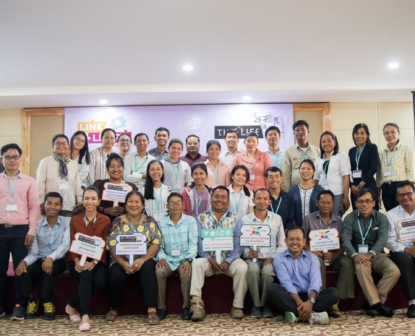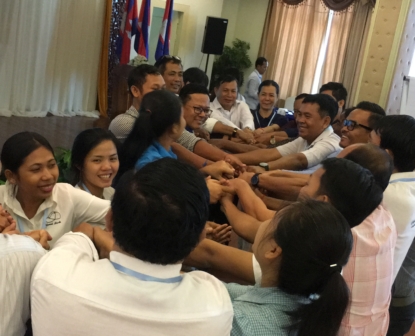Project
Voices of People With Disabilities
-
Amount Funded
148,788 EUROProject Duration
01 Feb 2019 - 31 Dec 2020 -
-
Lead organisation
-
The Advocacy and Policy Institute (API) increases Cambodia’s democratic space by creating more effective advocates and responsive government institutions. API envisions a Cambodian nation that through poverty reduction and the protection of human rights creates a national culture of harmony with sustainable democratic, political, and economic stability. API engages with all social sectors to ensure that when solutions are reached, they are of the greatest benefit to the community, gaining respect and confidence of both the Cambodian people and its international supporters.
-
Organisation
The Advocacy and Policy Institute (API) increases Cambodia’s democratic space by creating more effective advocates and responsive government institutions. API envisions a Cambodian nation that through poverty reduction and the protection of human rights creates a national culture of harmony with sustainable democratic, political, and economic stability. API engages with all social sectors to ensure that when solutions are reached, they are of the greatest benefit to the community, gaining respect and confidence of both the Cambodian people and its international supporters.
-
Project
The Voices of People With Disabilities project tests and learns how citizens with disabilities can better use the provisions provided by the implementation of the National Social Accountability Framework (I-SAF). This provision makes their voices to be heard by claiming better access to services and participation in local governance. The project works with 150 People With Disabilities (50% women and at least 60% youth with disabilities) in five communes of Tramkak district and Takeo province. The project applies a twin-track approach of fostering self-empowerment by people with disabilities, and their inclusion by the mainstream community, giving space to the arts as a vehicle for social transformation and empowerment. This enhances representation and voices of persons with disabilities in all the new I-SAF stages from 2019-2023. It enhances responsiveness to the voices and claims of persons with disabilities, which may influence the national I-SAF policy and practise. The ultimate impact of this project is hopefully to have better access to services in health, education and commune administration (plus new sector(s) of I-SAF Phase II) will significantly improve for people with disabilities, accomplishing major progress in realising human rights awareness of people with disabilities in Cambodia.
-
-
The Voices of People With Disabilities project tests and learns how citizens with disabilities can better use the provisions provided by the implementation of the National Social Accountability Framework (I-SAF). This provision makes their voices to be heard by claiming better access to services and participation in local governance. The project works with 150 People With Disabilities (50% women and at least 60% youth with disabilities) in five communes of Tramkak district and Takeo province. The project applies a twin-track approach of fostering self-empowerment by people with disabilities, and their inclusion by the mainstream community, giving space to the arts as a vehicle for social transformation and empowerment. This enhances representation and voices of persons with disabilities in all the new I-SAF stages from 2019-2023. It enhances responsiveness to the voices and claims of persons with disabilities, which may influence the national I-SAF policy and practise. The ultimate impact of this project is hopefully to have better access to services in health, education and commune administration (plus new sector(s) of I-SAF Phase II) will significantly improve for people with disabilities, accomplishing major progress in realising human rights awareness of people with disabilities in Cambodia.
-
“I was enabled to participate in all meetings in the commune or villages. Overall, these events make me more confident to raise my voice and I also learned more about our rights as people with disabilities. Moreover, I can bring the news back to the village to tell other people with disabilities that could not attend the meeting about what is going on.” – Srey Nu, a community volunteer with visual impairment
As a background to this project, anticipated improvements to the Implementation of the National Social Accountability Framework (ISAF) included integrating a minimum quality of standards for disability inclusion. Revisions suggested for the ‘ISAF Operational Guidelines for NGO Partners’ aim to remove three types of barriers for People with Disabilities (PWD), including attitude barriers (PWD facing discrimination, being ignored or misunderstood), physical access barriers (lack of proper ramps, chairs, audio and visual aids, overly technical language), and transportation barriers (not being able to physically access services, modes of transportation due to disability). Additional recommendations included the gathering of disaggregated monitoring and evaluation data for PWD during the implementation of ISAF activities, so that more accurate data can be collected on the impact of these activities on PWD. However, given the large scope of ISAF as a national program, it seemed costly to implement disability-inclusive ISAF activities as merely an add-on element.
The Project “Voices of People with Disabilities” by the Advocacy and Policy Institute (API) organised many specific ISAF activities, such as the Join Accountability Action Plan (JAAP), pre-meetings and interface meetings just for PWD in Tramkak district. The project’s proudest was the high involvement of PWD in the Community Scorecard process and JAAP as part of ISAF. A snowball survey was conducted in 7 communes with 514 PWD of different age groups to identify what was relevant for them around ISAF. Among 121 issues that were raised, 61 issues were solved while the remaining issues required intervention from related ministries and will be considered to be placed in the 2021 Commune Investment Plan (CIP). Additionally, empowerment workshops were organised with 185 people attending across the 7 communes to facilitate their participation in the Community Scorecard process. Many gained confidence to voice their concerns, particularly on health services.
Through the project, PWD had more opportunities to participate in ISAF activities (interface meetings and events) and have their opinion heard. This is in contrast to other ISAF areas, where PWD were not specifically targeted, invited, or empowered to participate in activities, rather they were discriminated against and isolated. The project’s work in Tramkak district became a model for other ISAF activities in other districts. A future perspective is that ISAF Phase 2 will give an opportunity to implement mainstream community awareness that is fully inclusive of PWD, the poor, and other minorities, with activities that integrate inclusive focus groups and home visits for marginalised groups.
The project provided service providers (25 people, including 4 women) with in-depth training on disability inclusion. Through Epic Arts, the training of these service providers to thoroughly understand the need for disability inclusiveness was innovative, using the arts, movement, and participatory methods to teach and demonstrate the issues of disability inclusion. Epic Arts integrated performances and videos made by PWD into the training, including 2 videos for raising awareness on promoting inclusive citizen engagement on ISAF activities, 2 project documentaries videos published on the API website and social media, and 6 disability art performances. This was a powerful method to encourage service providers at the local, sub-national level and national levels to see PWD are real and capable members of society. Additionally, 3 disability inclusion training sessions on ISAF were conducted separately with sub-administration groups, Community Accountability Facilitators (CAF), and the API project team to fully understand the importance of disability inclusion in ISAF.
The project also empowered PWD by incorporating them as Community Volunteers (CV), providing the opportunity and capacity building for them. The training included topics of introduction to ISAF, citizen monitoring and disability inclusion, aiming to ensure CV understood the needs and situation of PWD and how to actively engage them. Four representatives of PWD were selected as CV and served as role models within the ISAF activities as well as an inspiration to other PWD within the wider community to make a valid and worthwhile contribution to society. This was a very effective and empowering aspect of the project, as the CV became confident individuals who are capable of participating and daring to talk about PWD issues.
With the integration of social and disabilities inclusion, the minimum standard of ISAF operational guideline (phase II) was successfully reviewed and developed with full support by the National Committee for Democratic Development (NCDD) and NGOs networking on ISAF. Beyond these minimum standards, the guidelines introduced methods and actions that correspond to best practices and lessons learned from various organisations. This new guideline was acknowledged by the government body and will be used nationwide. The project launched and online orientation workshop on the new operation guidelines, which was jointly coordinated with other NGO partners and with 91 participants (26 female). Additionally, a 5-episode video series was produced to promote social and disability inclusion mainstreaming as part of this training workshop.
Project documentary:
- “Let’s Make Tramkak More Inclusive”:
https://www.youtube.com/watch?v=H6MRnBFOU7Q&list=PLZ9o7v7qn2PmdXnIQ8yoR90SPHPle1xCL&index=3
- “Social Accountability Means Inclusion”:
https://www.youtube.com/watch?v=uaNtRobhY94&list=PLZ9o7v7qn2PmdXnIQ8yoR90SPHPle1xCL&index=4
- “Voices of Persons with Disabilities in Social Accountability”:
https://www.youtube.com/watch?v=tRs2Iw9lwpU&list=PLZ9o7v7qn2PmdXnIQ8yoR90SPHPle1xCL&index=5
- Episodes 1-5, “Let’s Make ISAF More Inclusive”:
https://www.youtube.com/watch?v=BJWq1kCJ-9o
https://www.youtube.com/watch?v=H4OuY5z0inE
https://www.youtube.com/watch?v=_jrJXbPX9l4
https://www.youtube.com/watch?v=in3HuWU0kuU
https://www.youtube.com/watch?v=mF_ZTubnLVQ
Publications:
- “Our Voices Matter”:
https://www.youtube.com/watch?v=AMT46jNHZZE&list=PLZ9o7v7qn2PmdXnIQ8yoR90SPHPle1xCL&index=1
- “Proud To Be Me”:
https://www.youtube.com/watch?v=9abkKnDuW8o&list=PLZ9o7v7qn2PmdXnIQ8yoR90SPHPle1xCL&index=2
- “I Can Get Married”:
https://www.youtube.com/watch?v=3HnB0pD8xvc&list=PLZ9o7v7qn2PnjxqAiOUpMwDyp3KYoRYvK
- “I Can Vote”:
https://www.youtube.com/watch?v=F1oo9z9I-vM&list=PLZ9o7v7qn2PnjxqAiOUpMwDyp3KYoRYvK&index=2
- “I Can Be a Role Model in Farming”:
https://www.youtube.com/watch?v=_Ja2sSBR-WM&list=PLZ9o7v7qn2PnjxqAiOUpMwDyp3KYoRYvK&index=3
- “I Can Work”:
https://www.youtube.com/watch?v=hx64iwXWfHU&list=PLZ9o7v7qn2PnjxqAiOUpMwDyp3KYoRYvK&index=4
- “I Have the Right to Get Equal Access to Healthcare”:
https://www.youtube.com/watch?v=-I0Mtw0yQCw&list=PLZ9o7v7qn2PnjxqAiOUpMwDyp3KYoRYvK&index=5
- News





